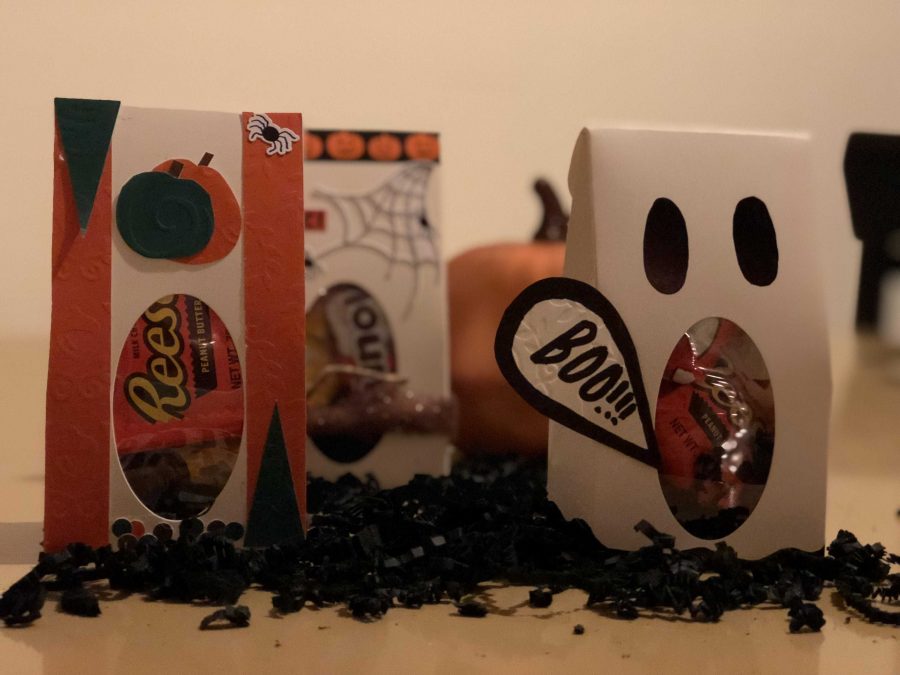Halloween Traditions On Hold Amidst Global Pandemic
Courtesy of Chronicle archives.
October 29, 2020
With rising COVID-19 cases in Utah and the persistence of the pandemic throughout the country, Halloween may look different this year.
Many traditional Halloween festivities are not harmonious with social distancing guidelines. The CDC encourages people to avoid any kind of trick or treating, indoor costume parties, haunted houses, or traveling to fall festivals. These activities are considered the highest risk of typical Halloween activities.
The CDC recommends if any group activities are held, participants should carefully follow social distancing guidelines and check their local restrictions.
Things like outdoor movie nights where people wear masks and sit 6 feet away, offering goodie bags on driveways to neighbors, or a distanced outdoor costume parade might be of less risk while still satisfying some of those traditions.
Some other safer alternative activities recommended by the CDC include; carving pumpkins with household members and displaying them, carving pumpkins with neighbors or friends outdoors at a safe distance or virtually, decorating your house or living space, virtual Halloween costume contest, scary movie night with household members, or an in-home scavenger hunt
Per CDC guidelines, traditional parties and get-togethers should be altered for safety or canceled.
The U has placed restrictions on many events like Greek row parties.
Officers Circle at the U typically holds their annual “Officers Hollow,” a community Halloween event, where they decorate the houses, make fun activities for kids and invite them to participate in games and trick or treating. The event was canceled this year due to COVID-19 precautions.
“Last year, the Humanities House decorated with a Toy Story theme, and we gave the kids candy and let them color Toy Story coloring pages. We also dressed up as different Toy Story characters. It was really fun, but we aren’t allowed to do Officer’s Hollow this year because of the coronavirus,” said Alexandra Michelle, a Humanities House resident.
As people come up with ways to safely do things like trick or treating and having Halloween parties, the internet has been passing around the idea of Rube Goldberg machines that would indicate placement for a treat bag outside their home, connecting to a line of passages to where someone would put the piece of candy to travel through the system.
There have also been ideas of candy chutes floating around the internet, using things like confetti launchers and T-shirt slingshots that you might see at a big sports game.
This prevents contact between children and those handing out candy as well as many hands reaching into the same bowl.
Regardless, the CDC recommends against any trick or treating and stresses practicing social distancing guidelines if people do choose to celebrate in these social ways.
Kori Taylor has worked for the U Hospital since 1987 and has served as air-med flight coordinator for the past 11 years and said he is lucky to not be directly dealing with COVID-19 patients because if he or any of the 12 people on the team are infected, they likely will all have to be quarantined.
Taylor emphasized the reality of this problem in all health departments and said many health professionals are doing jobs they are not used to due to COVID-19 rates and a need for healthcare workers.
“Do you really want your gynecologist inhibiting you? And that’s what it’s going to come down to is people that may work in the healthcare industry but they are not used to doing these jobs. Nurses in the ICU are overworked and extremely stressed out,” Taylor said.
Taylor agrees with the CDC, stating that activities like trick or treating are far less hazardous than the many Halloween parties that happen every year.
“If you’re gonna go do the activities, just wear a mask and wash your hands. It does really upset me when I go into stores and I see people not wearing masks. I truly think that that is a huge factor in transmission. People are gonna get it. A lot of people are gonna get it. It’s just whether we can handle [the] healthcare or not,” Taylor said.







